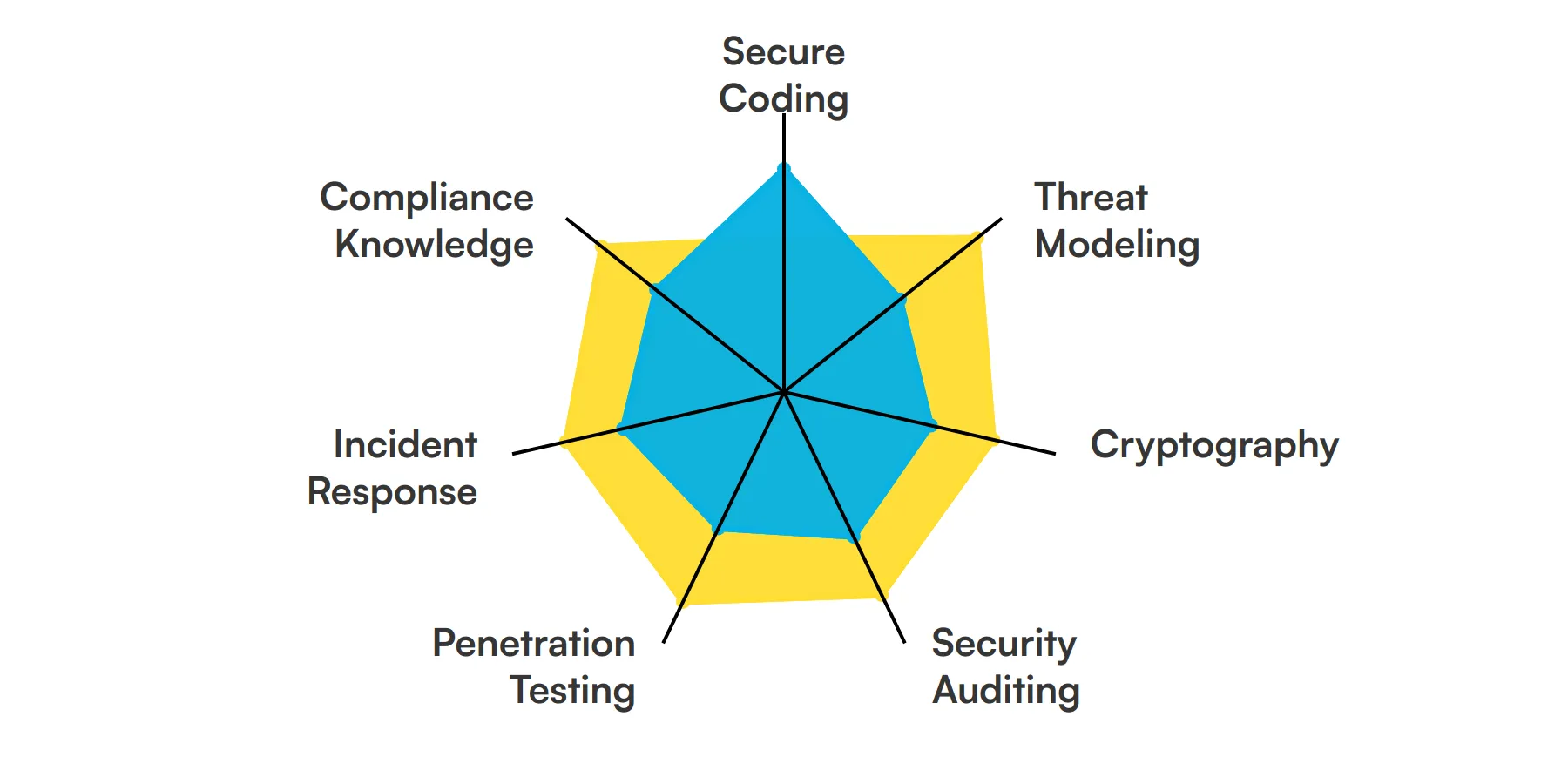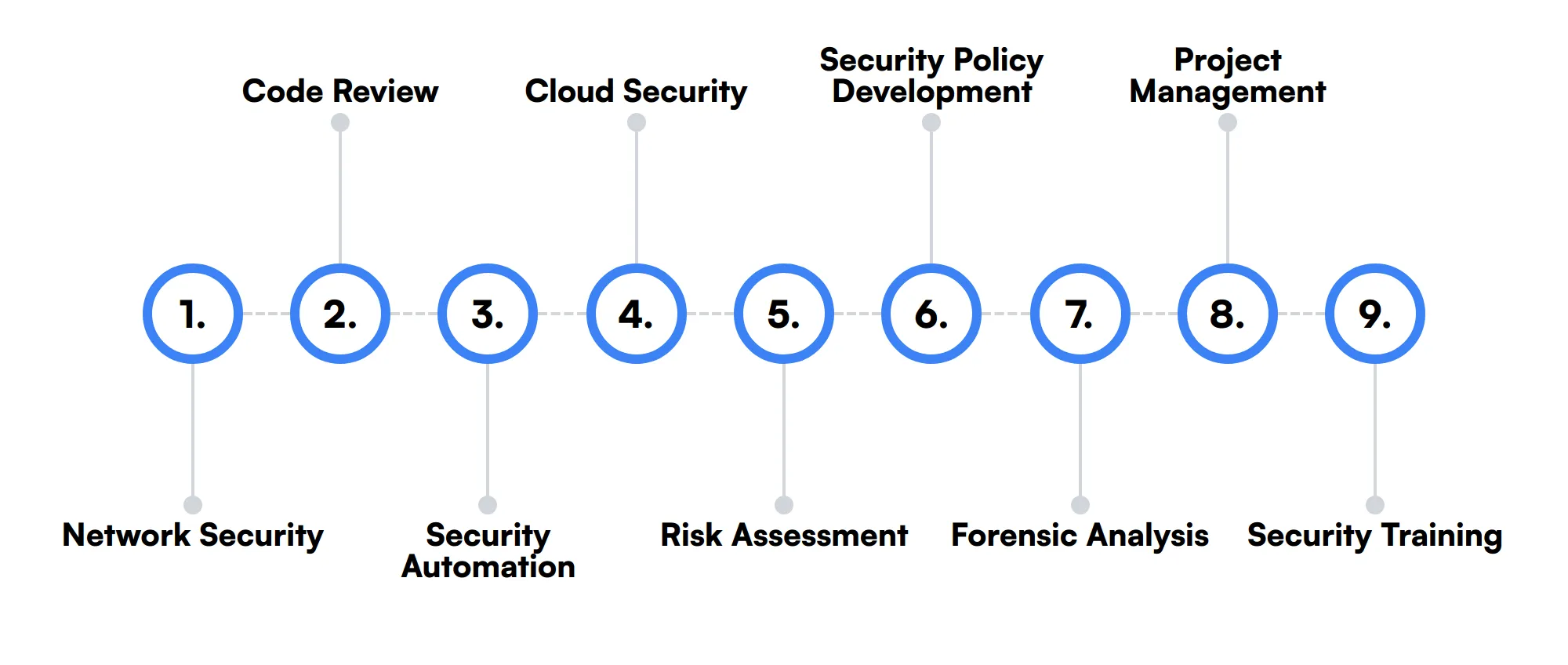Software security engineers are fundamental in safeguarding a company's digital assets. They ensure the security of software applications and systems against various types of cyber threats.
Key skills for a software security engineer include proficiency in security protocols, understanding of encryption technologies, and familiarity with secure coding practices. Additionally, analytical skills and attention to detail are crucial in identifying and mitigating vulnerabilities.
Candidates can write these abilities in their resumes, but you can’t verify them without on-the-job Software Security Engineer skill tests.
In this post, we will explore 7 essential Software Security Engineer skills, 9 secondary skills and how to assess them so you can make informed hiring decisions.
Table of contents
7 fundamental Software Security Engineer skills and traits
The best skills for Software Security Engineers include Secure Coding, Threat Modeling, Cryptography, Security Auditing, Penetration Testing, Incident Response and Compliance Knowledge.
Let’s dive into the details by examining the 7 essential skills of a Software Security Engineer.

Secure Coding
Secure coding is the practice of writing software in a way that guards against the introduction of security vulnerabilities. A Software Security Engineer uses this skill to ensure that applications are not only functional but also resistant to malicious attacks, safeguarding sensitive data from breaches.
For more insights, check out our guide to writing a Application Security Engineer Job Description.
Threat Modeling
Threat modeling involves identifying potential security threats and vulnerabilities in the early stages of software development. Software Security Engineers use this technique to anticipate and mitigate risks, ensuring the security architecture is designed to handle potential threats effectively.
Cryptography
Cryptography is essential for protecting data integrity, confidentiality, and authentication. Software Security Engineers implement cryptographic techniques to secure data transmissions and storage, and to ensure that sensitive information remains accessible only to authorized users.
Check out our guide for a comprehensive list of interview questions.
Security Auditing
Security auditing involves the systematic evaluation of security policies, applications, and systems to identify vulnerabilities. Software Security Engineers conduct audits to ensure compliance with security standards and to fortify systems against attacks.
Penetration Testing
Penetration testing simulates cyber attacks to identify vulnerabilities in security systems before they can be exploited maliciously. Software Security Engineers perform these tests to strengthen the security posture of software applications.
Incident Response
Incident response is the practice of handling security breaches or attacks. Software Security Engineers need to be adept at quickly identifying issues, mitigating damage, and implementing solutions to prevent future occurrences.
For more insights, check out our guide to writing a Incident Manager Job Description.
Compliance Knowledge
Understanding and adhering to regulatory compliance requirements is critical for Software Security Engineers. They ensure that software meets standards such as GDPR, HIPAA, or PCI DSS, which govern data security and privacy.
9 secondary Software Security Engineer skills and traits
The best skills for Software Security Engineers include Network Security, Code Review, Security Automation, Cloud Security, Risk Assessment, Security Policy Development, Forensic Analysis, Project Management and Security Training.
Let’s dive into the details by examining the 9 secondary skills of a Software Security Engineer.

Network Security
Knowledge of network security protocols and measures is important for Software Security Engineers to secure the infrastructure on which software operates.
Code Review
Regular code reviews help identify security flaws and ensure adherence to best coding practices. This skill is important for maintaining the overall security of the software.
Security Automation
Automating security tasks such as continuous integration and continuous deployment (CI/CD) for security testing can help in identifying vulnerabilities early and often, reducing the risk of security breaches.
Cloud Security
With the increasing adoption of cloud services, understanding cloud security is crucial for protecting applications that operate in a cloud environment.
Risk Assessment
Evaluating the potential risks associated with security threats allows Software Security Engineers to prioritize security efforts and resource allocation effectively.
Security Policy Development
Developing and enforcing security policies is key to maintaining an organization’s security standards and protocols.
Forensic Analysis
After a security breach, forensic analysis is crucial for determining how the breach occurred and for preventing future incidents.
Project Management
Effective project management ensures that security practices are integrated throughout the software development lifecycle, keeping projects on track and within security specifications.
Security Training
Providing security training to other team members is important to raise awareness and ensure that security practices are followed across the organization.
How to assess Software Security Engineer skills and traits
In the dynamic field of software security, assessing the skills and traits of a Software Security Engineer is more than just reviewing a resume. It involves a deep dive into their practical abilities in secure coding, threat modeling, cryptography, and more. Understanding how to evaluate these skills effectively is key to securing your digital assets.
Traditional interviews often fall short in gauging the depth of a candidate's expertise in areas like security auditing, penetration testing, and incident response. This is where practical assessments come into play. By simulating real-world scenarios, you can see how candidates handle security challenges firsthand.
For a comprehensive evaluation, consider using Adaface assessments, which are designed to mirror the complexities of real security tasks. These assessments help in identifying candidates who are not only technically proficient but also quick in their response to security threats. With Adaface, companies have seen a 85% reduction in screening time, making it a smart choice for your hiring process.
Let’s look at how to assess Software Security Engineer skills with these 4 talent assessments.
SQL Coding Test
Our SQL Coding Test evaluates a candidate's ability to design and build relational databases and tables from scratch, apply CRUD options, write queries and subqueries to filter data, and create indexes for faster SQL queries.
The test assesses their understanding of creating databases, tables, and performing CRUD operations. It also covers joins, subqueries, conditional expressions, views, indexes, and various SQL functions.
Successful candidates demonstrate proficiency in database design, query optimization, and data manipulation using SQL.
Cryptography Test
Our Cryptography Test evaluates a candidate's knowledge of cryptography concepts, network engineering, and cyber security.
The test covers digital signatures, cryptography algorithms like RSA, hashing techniques, encoding and decoding, and cyber security fundamentals.
Candidates who perform well show a strong understanding of cryptographic principles and their application in securing data and communications.
Penetration Testing Test
Our Penetration Testing Test evaluates a candidate's knowledge and skills in penetration testing, network security, vulnerability assessment, ethical hacking, and web application security.
The test assesses their ability to identify vulnerabilities, exploit them ethically, and provide recommendations for improving the security posture of systems and applications.
High-scoring candidates demonstrate expertise in penetration testing methodologies, network security protocols, and vulnerability management.
GDPR Online Test
Our GDPR Online Test uses scenario-based MCQs to evaluate candidates on their understanding of GDPR regulations and best practices for data protection and privacy.
The test covers data privacy, data protection, data breach management, consent management, data retention, data subject rights, and data transfer.
Candidates who excel in this test show a comprehensive understanding of GDPR compliance and the ability to implement data protection policies effectively.
Summary: The 7 key Software Security Engineer skills and how to test for them
| Software Security Engineer skill | How to assess them |
|---|---|
| 1. Secure Coding | Evaluate a candidate's ability to write code that prevents security vulnerabilities. |
| 2. Threat Modeling | Assess ability to identify and mitigate potential security threats in software designs. |
| 3. Cryptography | Test knowledge of encryption techniques and their application in securing data. |
| 4. Security Auditing | Check a candidate's skill in identifying and resolving security weaknesses. |
| 5. Penetration Testing | Determine expertise in simulating attacks to find security vulnerabilities. |
| 6. Incident Response | Evaluate response strategies to security breaches and their execution speed. |
| 7. Compliance Knowledge | Verify understanding of relevant security standards and legal requirements. |
System Design Online Test
Software Security Engineer skills FAQs
What is secure coding and why is it important for a Software Security Engineer?
Secure coding involves writing software in a way that guards against security vulnerabilities. It is important because it helps prevent exploits and ensures the integrity and confidentiality of data.
How can recruiters assess a candidate's threat modeling skills?
Recruiters can assess threat modeling skills by asking candidates to identify potential threats in a given system and explain how they would mitigate them. Practical exercises or case studies can also be useful.
What should a Software Security Engineer know about cryptography?
A Software Security Engineer should understand encryption algorithms, key management, and secure communication protocols. They should also be able to implement and troubleshoot cryptographic solutions.
How do you evaluate a candidate's experience in penetration testing?
Evaluate their experience by asking about specific tools and techniques they have used, such as Metasploit or Burp Suite. Request examples of past penetration tests they have conducted and the outcomes.
Why is incident response a critical skill for Software Security Engineers?
Incident response is critical because it involves identifying, managing, and mitigating security breaches. Effective incident response can minimize damage and reduce recovery time.
What role does compliance knowledge play in software security?
Compliance knowledge ensures that software meets legal and regulatory requirements. This helps avoid legal penalties and ensures the software is secure and trustworthy.
How can recruiters test a candidate's network security skills?
Recruiters can test network security skills by asking candidates to explain network security protocols, firewall configurations, and intrusion detection systems. Practical scenarios or problem-solving questions can also be effective.
What is the importance of security automation in a Software Security Engineer's role?
Security automation helps in automating repetitive security tasks, such as vulnerability scanning and patch management. This increases efficiency and ensures consistent security practices.

40 min skill tests.
No trick questions.
Accurate shortlisting.
We make it easy for you to find the best candidates in your pipeline with a 40 min skills test.
Try for freeRelated posts
Free resources



